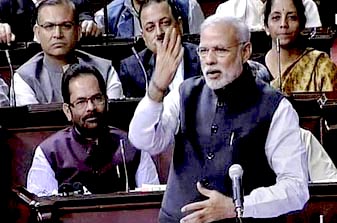New Delhi, Mar 4: The Narendra Modi government suffered an embarrassment in Rajya Sabha on Tuesday when non-NDA parties joined hands to force an amendment to the motion of thanks on the President's address to amplify their charge that the new regime had failed to curb high-level corruption and bring back black money allegedly stashed abroad.

Though the setback is just symbolic, the deficit of numbers is an old story which is not going to change anytime soon. It will, however, rankle the government because is now party to a resolution criticizing itself. In fact, the opposition remorselessly pressed home its huge numerical advantage immediately after the PM had stoutly rejected the charge of failure on the black money issue. Yechury and others in the opposition rebuffed parliamentary affairs minister M Venkaiah Naud's repeated pleas not to press for amendments. The opposition said it was not allowed to seek clarifications from the PM.
This was the fourth time when the opposition forced amendments to the motion of thanks on the President's address — all instances reflecting the mismatch in the numbers of the two Houses within two years of Lok Sabha elections. The previous examples were in January 1980 (Congress had swept LS polls but its opponents controlled Rajya Sabha), December 1989 (V P Singh helped by BJP and Left had a majority in LS but RS had a Congress majority), and in March 2001 (BJP along with its allies had a comfortable majority in LS but not in RS).
The setback brought out the government's failure to win over friends from non-aligned benches, especially from among those who are hostile to Congress and to each other. Arch rivals CPM and Trinamool Congress as well as SP and BSP voted in favour of the amendment. BJD, which was ambivalent about opposing the government until recently, joined in, ensuring that the amendments, which already had the support of Congress, JD(U), CPI and DMK, went through rather smoothly.
The margin underscored the tough task awaiting the government as it seeks passage of contentious legislations like land acquisition, insurance and others. The opposition frustrated the plan to pass the insurance bill by sitting tight over it, thus denying the government even the opening to call a joint sitting where it, with its superior LS numbers, can overwhelm the opposition. The government had always anticipated the problem and had tried to get around it by promulgating ordinances, and plans to hold
joint sittings. But the challenge has proved to be more nettlesome and has already delayed the government's plan to hit the ground running.
The opposition, if it so wants and if the RS chairman allows it, can thwart the passage of legislations for as long as a year — a worrying prospect, given the government's need to show results on the promises which swept Modi to power.
UPA enjoyed a far more favourable situation in Rajya Sabha. Congress was the largest party, while the logic of "secularism" helped it net numbers from parties which were not its official allies.
BJP is in a minority and will, even it does well in the elections for major states, remain so until mid-2017. Its "communal" image prevents it from garnering allies. In fact, its resurgence and growth in new areas has been the catalyst for the coming together of rivals like CPM and Trinamool.
The amendment, moved by Yechury and Rajeeve, regretted that "there is no mention in the (President) address about the failure of the government to curb high-level corruption and to bring back black money". Since the House passed the amendment, it will now be added to the President's address.
Though the parliamentary affairs minister tried to persuade Yechury from moving the amendment, saying there was a mention about black money and his concern had been noted, the CPM leader refused to budge, saying the opposition was not allowed to seek clarifications from the PM.
He and others in the opposition also took objection to Modi leaving the House soon after his hour-long reply, and brushed aside Naidu when he said that the PM, being a member of Lok Sabha, could not have stayed on once the members had asked for division.
The CPM leader also questioned why the opposition had not been allowed to make interjections as they sometimes do when they disagree or even to seek clarifications. "Even the leader of opposition was not allowed... This is violation of all norms and procedures and parliamentary democracy in this House," he said.
The House witnessed an uproar when Union minister Ravi Shankar Prasad reiterated that as far as clarifications were concerned, they were never allowed to which Yechury retorted, "I know my rights as a member, my right is inalienable."






Comments
Add new comment